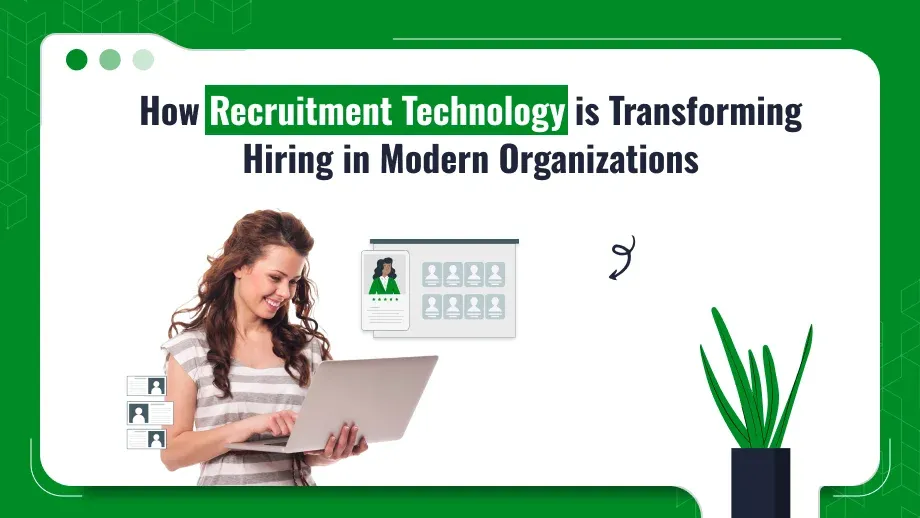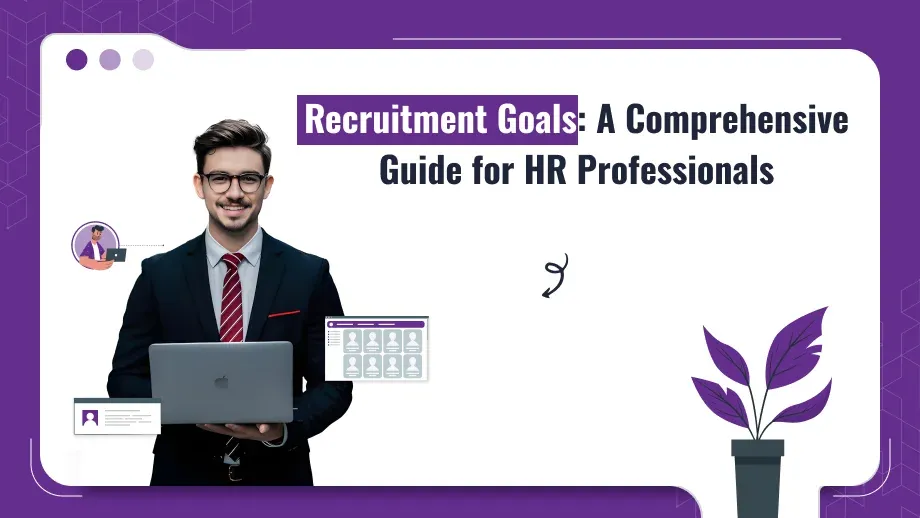
Perhaps at the top of the list regarding the competitive landscape of current hiring is finding the best talent most effectively. The company has a way to manage its hiring processes innovatively, which simplifies the recruitment technology process and reduces time-to-hire while also building a better candidate experience for the benefit of the recruitment organization. With the job market being at times competitive, companies save dollars but also improve their odds of attracting the best candidates possible.
With technology and recruitment now working hand in glove, businesses can now avail of various recruitment technology tools to fulfill specific hiring needs. Starting from Applicant Tracking System (ATS) to manage applicants, to AI tools that help screen applications far more efficiently, recruitment allows companies to make data-driven decisions and attract the best talent. This article examines the advantages, difficulties, and recent development of technology and recruitment and how it can be used for business benefits.
What is Recruitment Technology?
It defines recruitment technology tools as software and tools that aim to automatically, manage, and advance the hiring process. Its core function is to free recruitment teams from the most tedious work in hiring activities to free time up for more strategic and long-term hiring considerations.
Many such technologies and tools include applicant tracking systems, candidate relationship management CRM, AI-powered screening tools, and video interview applications.
Technology for recruitment process from sourcing and screening to scheduling interviews and onboarding-streamlines the hiring process. More than simply automating the hiring process, however, recruitment and technology are aimed at efficiency in hiring, excellence in the candidate experience, and support for data-driven recruitment decisions.
Benefits of Using Technology in Recruitment
Recruitment Technology has come to show several benefits on its side; hiring will be faster, and even easier for that matter. The recruitment process gets easier for the recruiter himself and for the candidate himself. Here are the primary benefits:
Faster and More Efficient Hiring
Technology and recruitment automate the routine work of resume screening, scheduling interviews, and sending follow-up candidate e-mails. It is able to free up time for recruiters to focus on higher-value, more strategic tasks that relate to filling a position more quickly, thus allowing businesses to stay ahead in a busy market.
Cost Savings
The technology for recruitment saves the vast extent of expenditure incurred by firms in recruiting. Recruitment reduces the third party recruiting dependency, and time-to-hire thereby optimizing resource utilization through saving advertisement expenditure and probabilities of wrong recruitments. This makes it cost-effective at each stage of the hiring process.
Improved Candidate Experience
In the modern market, candidates wish to undergo a fast, hassle-free, and transparent hiring process. Recruitment Technology would thus ease this process through self-service options such as candidate portals and the use of chatbots providing instant answers to questions.
A good experience will not guarantee a job, but having a great experience will surely mean having a positive attitude towards the company. This helps with branding as well by making the company a good place to work.
Data-Driven Decision Making
Arguably, data is the recruitment currency of today. With recruitment reports given from a variety of tools designed for recruitment, firms get insight into vital statistics regarding time-to-hire, cost-per-hire, candidate satisfaction, and rate of acceptance of an offer made.
Technology for recruitment solutions equips organizations with the means of making data-driven decisions by discovering ways in which they may refine their hiring process and eventually create efficiency over time.
Key Types of Recruitment Technology Tools
Technology and recruitment is a software tool that coordinates the several processes involved in recruiting. Some of the most critical recruitment technologies and how each aids in the recruitment process are given below:
Applicant Tracking Systems (ATS)
ATS platforms are the core technology for recruiting. They support application management by automatically screening resumes, tracking applicant progress, and delivering communication. The ATS systems make candidate data easy to organize; no application goes to waste, and recruiters can trace where each candidate is along the hiring process.
Candidate Relationship Management (CRM) Software
CRM tools for recruitment help organizations keep contacting a candidate for a prolonged period. This is particularly useful for connecting with passive candidates who may not be prepared to apply at the moment but would be an ideal fit later. CRM systems ensure that at the time of opening a position, companies will already have a solid talent pipeline, thereby cutting down time-to-hire.
Artificial Intelligence Tools
AI is changing technology recruitment: Advanced screening for predicting a candidate’s fit and diminishing hiring bias. Moreover, AI-driven proctoring tools play a crucial role in preventing candidate cheating during online assessments, maintaining the credibility of the evaluation process. AI-based tools can match candidates to the requirements of a job, analyze resumes, and even provide candidate insights through keywords and skills, helping recruiters find the best talent in a faster manner.
Video Interviewing Platforms
Video interviewing is now an essential part of the technology recruitment sector. Video interviewing platforms enable recruiters to interview people from any corner of the world, saving on traveling costs. Video interviewing platforms also allow flexible scheduling and recorded interviews that can be shared with stakeholders if required.
Cloud-Based HRMS Software
Cloud-based HRMS platforms support many more activities than recruitment, such as onboarding, payroll management, and employee management. They help in a smooth transition of candidates into employees while reducing all kinds of paperwork and exposing newcomers to a holistic onboarding program. Cloud HRMS platforms are, in fact, perfect for companies seeking an end-to-end technology-enabled recruitment and HR process.
Ready to revolutionize your hiring?
Discover how recruitment technology can enhance your talent acquisition strategy.
Potential Challenges When Using Technology in Recruitment
However, with the help of recruitment technology, there are many pros but also cons in consideration:
Maintaining the Human Touch
Automation too much might give the taste of an impersonal process to hiring, that is, the candidates lose interest in applying. A proper balance between quality communication is essential in recruitment technology to hold a favorable candidate experience.
Data Privacy and Security
The use of tech recruitment is associated with a lot of personal data, so data privacy has to be at the top. Data protection has to be highly considered to gain the trust of all candidates and not get on the wrong side of the law.
Potential for Bias in AI Tools
Since no precautions have been taken towards AI minimizing many other biases, it can still develop algorithms on how to remain biased. This becomes an even more recurring recruitment challenge in line with which the firms struggle to overcome, especially upon reviewing and tweaking the toolset based on AI recruiting.
Complexity of New Technologies
New recruitment tools are hard to implement because they demand complex high-end digital tools that would be unfamiliar to some members of the team. Training and long-term support are the essential ingredients to a team mastering full utilization without getting buried by the new technology’s intricacies.
Data-Driven Recruitment: Using Metrics to Improve Hiring Decisions
Perhaps one of the best strengths of recruitment technology is access to data. Metrics in recruiting can assist an organization with improving its hiring processes and outcomes by gaining insights about them. The following are a few of the more important metrics measured by recruitment technology:
- Time-to-Hire: A measure that tracks how much time elapses to fill an open role and identifies ways in which it can be improved
- Cost-per-Hire: Measuring how much the company spends filling a job so that its recruitment expenditure can be regulated.
- Quality-of-Hire: It illustrates the performance of new hires, which can be determined if the recruitment process brings in high-quality talent.
- Offer Acceptance Rate: It follows the number of candidates who accept offers, which will depict how attractive the company’s offers and position are.
- Candidate Experience: It gathers feedback from the candidates to identify weak points in the hiring process and improve them.
This allows companies to identify bottlenecks, make adjustments that are informed, and know whether their recruitment strategy is aligned with organizational goals.
Enhancing Diversity and Inclusion with Recruitment Technology
Any organization prefers diversification at the workplace because of the advantages associated with it. Recruiting Technology has various features through which it can enhance the workforce for organizations by increasing fairness and removing biases at the hiring stage.
- Blind Recruitment Software: Removing identifiable details from resumes makes screening bias-free.
- Structured Interview Platforms: The same questions of the interview will be asked to all the applicants so that recruitment is strictly based on skill and not on personal characteristics.
- Diversity Analytics: Measuring diversity metrics helps organizations understand how effective the process of recruitment is and will set proper targets for diversity.
Technology Recruitment for support of diversity can help build an innovative and inclusive workplace that encompasses a wide variety of perspectives and ideas.
Streamlining Onboarding with Integrated Recruitment Technology
Onboarding is one of the recruitment processes that affect long-term retention. Onboarding recruitment technology helps the new hires feel supported and prepared from day one.
The integration can be done with a centralized HRMS platform. There is also automation of paperwork for new hires, provision of learning resources, and the possible connection of new employees with teams. This can help create a sense of employment for candidates even before an extended period after hiring and, in turn, contributes to productivity and enhances employees’ satisfaction levels, resulting in better retention rates and overall employee experience.
The Latest Developments in Recruitment Technology
With each passing day, tech recruitment is progressing with new trends in hiring.
Advanced AI and Predictive Analytics
AI and Predictive analytics predict what a candidate would do once placed in the company about his performance and fit. It same helps in guiding the Recruiters while making their decision so they place that particular candidate in that opening from where it can perform accordingly.
Virtual Reality (VR) Assessments
VR is used as a pilot for testing the skills within virtual environments. Here the candidates are permitted to be in a simulated environment wherein they can prove their capability in that field. It can be helpful, especially in very technical or problem-solving jobs.
Blockchain for Recruitment
Blockchain offers a secure way of authenticating candidate credentials and keeping data integrity and could be used to potentially make the recruitment process more transparent.
Mobile-First Recruitment Solutions
More and more people now are searching for employment opportunities on mobile devices; thus, the need has grown for mobile-first recruitment platforms, offering mobile-friendly applications and candidate portals to meet candidates in the most accessible way.
Conclusion
Recruitment Technology will be the requirement of those companies that can maintain their competitiveness in recruiting. For this, use tools such as ATS, AI-based screening, video interviews, and mobile-first solutions so that recruitment would become speedier, smarter, and cost-effective for the organizations. Adaptation to these latest technologies, following recruitment metrics, and the decisions on data ensures flexible yet effective recruitment processes supporting success.
With advancing technology, attraction, engagement, and retention of the best talent will get easier as people will take up technology and recruitment, leading to a future-ready workforce while keeping one step ahead of competitors.






